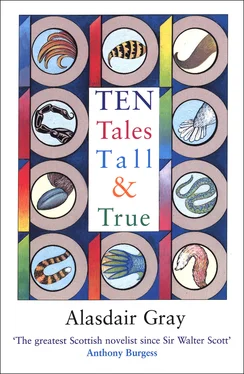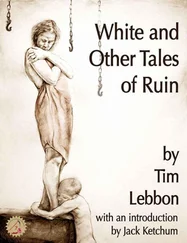There is a preliminary rolling of drums with a sombre yet challenging blast of trumpets. Mr Dear, Mrs Dear and the teacher rise to their feet and the mother seems about to do so when the old man hisses, “Miriam! Patsy! Stay exactly where you are.”
“Excuse me sir,” cries Mr Dear, “Are you not going to stand?”
“No I am NOT!”
“Oh please sh dear!” whispers Mrs Dear to her husband who cries, “Shut up dear, I will not sh! You sir, I gather are one of those left-wing militant extremists who yearn for a discredited Bolshevik railway system. Well the British railway system has no harsher critic than myself. I was sorry when they nationalized it, saddened when they axed off the branch lines and appalled by how long the government took to restore it to a responsible private company. But despite its grisly past our rail system was built by a combination of Irish brawn, Scottish engineering and English financial daring which made us once the foremost steam railway empire in the universe. Does this mean nothing to you?”
“Don’t talk to me about British Rail!” yells the old man over Noël Coward’s brittle patriotic tenor, “I worked all my life for British Rail. I was a fireman from the old LMS days to when they brought in bloody diesel! British Rail was destroyed by people like you — bloody accountants and lawyers and retired admirals on the board of directors—”
“That’s ludicrous!” cries Mr Dear, and “Stop it Dad!” cries the old man’s daughter, but nothing stops the flood of his articulate wrath: “—when they nationalized us the government said ‘British Rail belongs to the people now’ but who did we get on the new board of directors? Linesmen? Footplate men? Station-masters? Did we hell! We got the same old gang — stockbrokers, lieutenant colonels, civil servants with posh accents, the gang that eventually sold us out to the car manufacturers, the building societies and the oil corporations!”
“I am not listening to you!!” cries Mr Dear.
“I never thought you would,” says the old man chuckling and picking up his paper again. The music has stopped. The others sit down, Mr Dear looking as if he would prefer to do something more violent. There is another embarrassing silence, then the teacher slips across the aisle to Patsy’s seat and tells the old man quietly, “I was to a large extent entirely on your side in that little exchange, even though I stood up. I like the tune you see, and old habits die hard. But the title was inaccurate. Our railways are British, not English.”
She slips back to her seat as Patsy approaches shouting, “Mum Mum Mum!”
Patsy, terribly excited, is closely followed by a tall, lean, mildly amused looking man who says, “Good day good people! Does this small person belong to any of you?”
“Patsy,” says the mother, “Where have you been?”
“Wandering far too near the engine for anyone’s good,” says the stranger.
“How very naughty of you, Patsy. Thank the nice man for bringing you back.”
“But Mum!” says the child excitedly bumping its bottom up and down on the seat, “Nobody’s driving this train! The driver’s cabin’s empty! I looked inside!”
Mrs Dear gives a little gasp of horror. The mother says severely, “Patsy, that’s not a very nice thing to say, not with that bad rail accident in America last week. Apologize at once.”
“But Mum, it really was empty!”
“Dear, I’m terribly worried,” Mrs Dear tells her husband who says, “Don’t be stupid dear, the kid’s obviously gone the wrong way and blundered into the guard’s van.”
The teacher points out that the stranger said he found Patsy near the engine, but “The child knows nothing about mechanics!” declares Mr Dear, “Hardly anyone knows anything about mechanics nowadays. It wouldn’t surprise me to learn that modern trains are driven from an obscure cabin somewhere in the middle.”
“And it wouldn’t surprise me!” cries the old man violently, “To learn that British Rail has sacked all its drivers and never told the public a word about it!”
The women gasp in horror, Mr Dear snorts, the stranger laughs and tries to speak, but the old man talks him down: “You needed a driver in the days of steam — two of them counting the fireman — tough men! Strong men who knew the engine and could clean it themselves, and grasped every valve and stop-cock like it was the hand of a friend! Men who felt the gradient through the soles of their boots and heard the pressure in the thrusts of the piston. But nowadays! Nowadays it wouldn’t surprise me if the driver of this so-called train wasn’t lying back with a glass of brandy in a London club, watching us on a computer screen and half sloshed out of his upper-class over-educated skull!”
“You’re wrong and I can prove it,” says the stranger. They stare at him.
At first sight there is nothing unusual in this man whose modest smile seems to apologize for his slightly taller than average height. The large pockets, the discreet epaulets of his well-cut, dove-grey jacket would look equally inconspicuous in a cinema queue or an officers’ mess, yet he faces the six pairs of enquiring eyes with a relaxed and flawless confidence which so acts upon two of the women that they sigh with relief.
“Who the hell are you?” asks the old man, and the teacher says, “The driver — I recognize his voice.” “Correct! So you see, I’m not lying back in a London club, I’m here beside you. I really am one of you. May I join you for a moment?”
Taking a small metal frame from a pocket the driver opens it into a stool with a canvas seat, places that in the aisle and sits down facing them. Although his chin now rests on his steeply angled knees he does not look at all ridiculous. Most of the company are impressed.
“I feel so safe,” murmurs Mrs Dear, and “Stop scowling Dad, it isn’t polite,” says the mother, and Mr Dear says, “Excuse me sir, I have said harsh things about British Rail in my time …” (“Of course you have” says the driver genially) “… but I have never doubted that our trains are the safest in the world and our drivers second to none — if only the trade unions would stop confusing them with promises of Utopian conditions.”
“Thank you,” says the driver.
“Train driving seems to have changed in recent years,” says the teacher in a high clear voice.
“Excuse me madam,” says the driver, “I’ll gladly explain anything you do not understand after I’ve had time to … to …” (and suddenly he looks confused, embarrassed, almost boyish) “… you see it isn’t every day I have a chance to speak to John Halifax!”
“Eh!” says the old man staring at him.
“You are John Halifax, the last of the steam men? Who took three whole minutes off the Bundlon to Glaik run in the great railway race between LMS and the LNER in nineteen thirty-four?”
“You know about that?” whispers the old man with a wondering stare.
“You are a legend in railway circles, Mr Halifax.”
“But how did you know I was on the train?”
“Aha!” says the driver waggishly, “I’m not supposed to tell passengers certain things, but to hell with security. The ticket office clerks are not the ignorant gits the public assume. They keep me informed. I used your grandchild’s escapade as an excuse to seek you out, and here I am!”
“I see!” whispers the old man, smiling and nodding to himself.
“Please don’t get cross, but I need to ask you a terribly personal question,” says the driver, “It’s about the last great railway race. Do you remember stoking the Spitfire Thunderbolt up the Devil’s Kidney gradient with only three minutes to reach Beattock Summit or the race would be lost?”
Читать дальше












